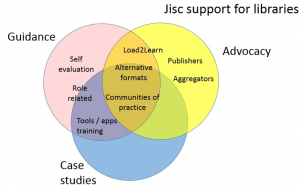
If you’re currently working in a library service and preparing for the impact of changes to the disabled student allowance this blog post is designed to give you a helpful overview of how Jisc can support you.
Our three main areas of focus for inclusive libraries has been advocacy, guidance, and case studies.
Advocacy:
We represent library interests on the Publishers Association Accessibility Action Group. This gives us an excellent platform to raise your issues with publishers, aggregators and others involved in the book supply chain. We have a positive profile in this group and as well as our generic work with other partners we have, on occasions, been able to influence issues with specific suppliers. If there are any issues that you feel would be relevant to bring to the attention of this group please do not hesitate to get in touch.
We have also worked closely with the Load2Learn service. Originally, a school-based service, its trusted status with publishers and its technical platform that allows sharing of accessible intermediate copies makes it an important ally for the FE and HE sectors. We have worked with several HEI’s and the RNIB to ensure their negotiations with publishers include access to appropriate HE/FE oriented textbooks. We are also exploring the potential for their industry standard book scanner to offer a bespoke scanning service for organisations without appropriate scanning tools.
We work with your communities to support them in supporting you – for example the CILIP blog posts on Libraries and print impairment and preparing for DSA changes – and a contribution to supporting library users with hidden disabilities.
Guidance:
There are two key sources of Jisc guidance on inclusive library services. The main Jisc website has role related guidance that covers maximising resources, minimising barriers and the accessible library as well as guidance on specific disabilities and appropriate technologies for supporting disabled learners. If you need more detail than is available on the main Jisc website use this accessibility blog. Note the library category function. Our guidance on alternative formats includes recommended workflow is as well as “DIY approaches” for students. We have guidance on technology tools, plug-ins and apps that can help support disabled learners in a library context. We can also point you to some of the key communities of practice where you can tap into the expertise of colleagues.
Case studies:
By working with some of the most respected inclusive library services, we become aware of some of the current best practices. Where possible we feed this back through our guidance but we can also give personalised support to meet your particular circumstances.
Checking your readiness
Key things to consider in terms of your “DSA change-readiness” are highlighted below.
1) Ensure others are playing their part – Are academic reading lists provided in good time? Do reading lists reference digital resources? Are appropriate productivity (alias assistive technology) tools available across the network? Are the right people telling students about them?
2) Meet as many needs as you can through mainstream/self-service solutions – Dyslexics will be one of the key casualties from DSA changes – do you have clear dyslexia friendly guidance on using your services? Does your guidance point towards technology solutions that foster independence (we can provide you with quality recommendations and guidance materials)? Are your ebook platforms accessible? Do you have guidance on their features?
3) Be strategic – ensure someone with clout has responsibility for accessibility and can work across the institution in a joined up way.
4) Find friends – join the relevant communities of practice. Get a sense of what others are doing and adapt what you think might work for you. Talk to your own students; there is no ‘right’ answer for all institutions – excellence have different forms.
Find out more
You can find out about these by contacting us directly, exploring the blog or requesting direct support from your Jisc account manager. We can
- join planning and strategy meetings remotely or provide online training support,
- where there is clear added value in terms of your strategy and practice we can support face to face meetings and training sessions,
- contribute to guidance for communities of practice,
- advise on specific issues or workflows.
We are in the process of developing online training to make it easy for us to meet your needs swiftly and efficiently. Get in touch. It’s what we’re here for.

One reply on “Jisc support for accessible library services”
Excellent for making a repository